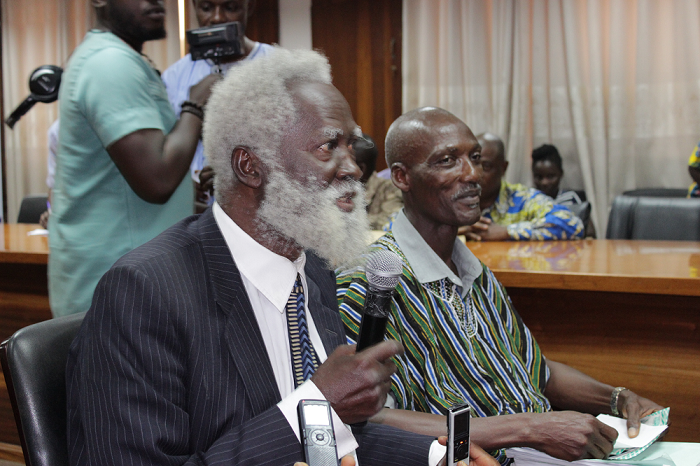
Ward-Brew dismissed in attempt to stop Dec 7
The dream of the flag bearer of the Democratic People’s Party (DPP), Mr Thomas Nuako Ward-Brew, to participate in this year’s presidential election was shattered by the Supreme Court yesterday.
In a unanimous decision, the court dismissed his prayer for an extension of the date for the submission of nomination forms and the subsequent suspension of the December 7, 2016 polls.
The applicant had argued that the postponement of the elections would enable him and other disqualified aspirants to have ample time to campaign.
But the Supreme Court unanimously dismissed his application as incompetent and awarded costs of GH¢3,000 against him.
The court was presided over by Mrs Justice Sophia Adinyira, with Justices Anin Yeboah, Vida Akoto-Bamfo, N. S. Gbadegbe, A.A. Bennin, Yaw Appau and Gabriel Pwamang as members of the panel.
The Court’s decision
Delivering its decision, the court said it considered the matter on its merit and procedure and realised it had no merit, both in form and substance.
It said the proceedings for which Mr Ward-Brew had filed his application was disposed of on November 7, 2016 and for that reason he was not permitted by law to invoke the original jurisdiction of the Supreme Court as he had done.
Touching on Mr Ward-Brew’s explanation that he was in Nigeria when the Electoral Commission (EC) extended the nomination period following a Supreme Court order, the court said that excuse was frivolous and without substance and, therefore, without merit.
It said the DPP was not a one-man party and so he (Ward-Brew) could have delegated others to submit the nomination forms in his absence.
The court further stated that Mr Ward-Brew was not vigilant enough in filling out his nomination forms.
Written response
The parties, prior to the court’s decision, had announced to the court that they intended to rely on their written statements of case.
Mr Thaddeus Sory represented the EC, while Mr Ward-Brew robed and represented himself.
Although Mr Ward-Brew is a lawyer by profession, he was not expected to robe. The court, nonetheless, allowed him to address it.
Issues of concern
Other issues of concern to the court were that the title of Mr Ward-Brew’s motion paper was different from the title on the affidavit in support.
It said the rules of court did not permit Mr Ward-Brew to initiate an action at the High Court to invoke the original jurisdiction of the Supreme Court.
Mr Ward-Brew explained that he had sight problems and so he could not go through the documents before filing them.
The court, nonetheless, took a short recess to consider his application and returned to dismiss it.
Ward-Brew’s argument
An affidavit deposed to by Mr Ward-Brew said he took the action against the EC after the EC had failed to reply him over his disqualification.
“The EC should have used courier services to inform the affected candidates concerning the Supreme Court order of November 7, 2016 to enable them to respond according to the limited time because that was their obligation, instead of replying on radio announcements and expecting the affected candidates to comply and meet the limited time set out by the Supreme Court, without taking into consideration distance and traffic issues in the city.
“This is an act of injustice on the candidates affected,” the affidavit in support indicated.
Background
The Supreme Court, on November 7, 2016, directed the EC to give a fair hearing to all disqualified presidential aspirants.
It directed the EC to give a hearing to all the presidential aspirants who were able to submit their nomination papers by close of the nomination day of September 30, 2016 and were disqualified without a hearing within the extended period.
The court, in its judgement, also extended the nomination period from Monday, November 7 to the close of working day on Tuesday, November 8.
